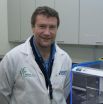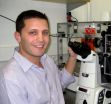(Press-News.org) Research by Indiana University paleobotanist David L. Dilcher and colleagues in Europe sheds new light on what Charles Darwin famously called "an abominable mystery": the apparently sudden appearance and rapid spread of flowering plants in the fossil record.
Writing in the Proceedings of the National Academy of Sciences, the researchers present a scenario in which flowering plants, or angiosperms, evolved and colonized various types of aquatic environments over about 45 million years in the early to middle Cretaceous Period.
Dilcher is professor emeritus at IU Bloomington in the departments of geological science and biology, both in the College of Arts and Sciences. Co-authors of the paper, published online this week, are Clément Coiffard of the Leibniz Institute for Evolution and Biodiversity Research in Berlin and Bernard Gomez and Véronique Daviero-Gomez of the National Center for Scientific Research in Lyon, France.
The paper draws on extensive fossil data from Europe, providing a comprehensive picture of how angiosperms evolved and connecting their evolution with changes in the physical and biological environments. Dilcher, who has studied the rise and spread of flowering plants for decades, said the scenario is consistent with findings from the fossil record in North America, including his own work showing that angiosperms occupied a variety of aquatic and near-aquatic environments.
"This attention to the total picture of plant groups and the paleo-environment begins to form a pattern," Dilcher said. "We're able to turn the pages of time with a little more precision."
Darwin wrote to Joseph Dalton Hooker in 1879, about 20 years after the publication of "On the Origin of Species," that the rapid development of higher plants in recent geological times was "an abominable mystery." The issue has long preoccupied paleobotanists, with competing theories seeking to explain how angiosperms supplanted ferns and gymnosperms in many regions of the globe.
Dilcher and his colleagues show that angiosperms successfully invaded certain environments, gradually spreading to others. They write that angiosperms migrated to new environments in three phases:
Freshwater lake-related wetlands between 130 million and 125 million years ago
Understory floodplains between 125 million and 100 million years ago
Natural levees, back swamps and coastal swamps between 100 million and 84 million years ago
While paleobotanists once focused on collecting fossil flora and trying to make connections with present-day varieties, Dilcher and his colleagues have produced new insights into the evolutionary biology of flowering plants through close analysis of morphology and anatomy.
Dilcher added that co-evolution with insects gave angiosperms an evolutionary advantage. Insects played a vital role in cross-pollinating plants and accelerating the spread of genetic material. Plants evolved the means to "advertise themselves" with fragrances and bright colors while producing pollen and nectar that provided food for insects.
###The article is available online at the PNAS website.
Research yields understanding of Darwin's 'abominable mystery'
2012-12-06
ELSE PRESS RELEASES FROM THIS DATE:
Environmental chemical blocks cell function
2012-12-06
Bisphenol A, a substance found in many synthetic products, is considered to be harmful, particularly, for fetuses and babies. Researchers from the University of Bonn have now shown in experiments on cells from human and mouse tissue that this environmental chemical blocks calcium channels in cell membranes. Similar effects are elicited by drugs used to treat high blood pressure and cardiac arrhythmia. The results are now presented in the journal "Molecular Pharmacology."
The industrial chemical bisphenol A (BPA) is worldwide extensively utilized for manufacturing polycarbonates ...
New evidence for epigenetic effects of diet on healthy aging
2012-12-06
New research in human volunteers has shown that molecular changes to our genes, known as epigenetic marks, are driven mainly by ageing but are also affected by what we eat.
The study showed that whilst age had the biggest effects on these molecular changes, selenium and vitamin D status reduced the accumulation of epigenetic changes, and high blood folate and obesity increased them. These findings support the idea that healthy ageing is affected by what we eat.
Researchers from the Institute of Food Research led by Dr Nigel Belshaw, working with Prof John Mathers and ...
New understanding can lead to srategies for dealing with neurodegenerative diseases
2012-12-06
Jerusalem Dec. 6, 2012 – A new understanding of what takes place on the cellular level during the development of neurodegenerative diseases, such as Parkinson's, Alzheimer's, ALS and Huntington's diseases, offers promise towards possible new strategies for combating such diseases, say Hebrew University of Jerusalem researchers.
Neurodegenerative conditions result from an impairment of motor function or cognitive function or both. This impairment results from degeneration in the particular area of the brain responsible for those functions.
Although these neurodegenerative ...
'Releasing' people from Catholic guilt increases generosity towards church, research shows
2012-12-06
People who recall being absolved of their sins, are more likely to donate money to the church, according to research published today in the journal Religion, Brain and Behavior.
Researchers from Royal Holloway and the University of Oxford assigned participants two memory tasks. In the first, they were asked to privately recall a sin that they had committed in the past, while in the second, they recalled attending confession for this sin or imagined doing so, if they had not confessed in reality.
Each participant was also given an opportunity to donate to a local Catholic ...
My microbes
2012-12-06
We all have E.coli bacteria in our gut but each of us carries a version that is genetically slightly different. The same can be said of most gut microbes: our own gut metagenome, that is the sum of all the genomes of all our gut microbes, appears to be really specific to each of us, and to remain stable over time. For the first time, researchers from the European Molecular Biology Laboratory (EMBL) have studied this metagenome at such a high resolution that individual mutations in the various strains could be analysed. Their findings, published today in Nature, could have ...
Insight into DNA reprogramming during egg and sperm cell development
2012-12-06
Scientists at the Babraham Institute have gained a new understanding of when and how the DNA in developing egg and sperm cells is 'reset', in preparation for making a new embryo. It is well known that small chemical groups can be added to DNA to alter gene activity, these modifications to the DNA are acquired during development in the womb and throughout adult life and can arise from changes in environment. Most of these modifications are removed in immature egg and sperm cells to 'reset' the DNA and to erase any 'environmental memory', but some remain. Decoding this reprogramming ...
Cocktail boosts immune cells in fighting cancer
2012-12-06
Fighting cancer using the body's own defense system is a promising treatment approach. Immune therapies have even become clinical routine in treating a few cancers such as malignant melanoma and prostate cancer. Natural killer cells (or NK cells) are considered to be particularly suitable weapons against cancer. They are part of the innate immune system and respond to a wide range of cancer cells of diverse origin. Moreover, NK cells also kill tumor cells that have lost a specific target and go unnoticed by other immune cells.
"The big problem in using NK cells for therapy ...
Warm sea water is melting Antarctic glaciers
2012-12-06
The ice sheet in West Antarctica is melting faster than expected. New observations published by oceanographers from the University of Gothenburg and the US may improve our ability to predict future changes in ice sheet mass. The study was recently published in the journal Nature Geoscience.
A reduction of the ice sheets in Antarctica and Greenland will affect the water levels of the world's oceans.
It is therefore problematic that we currently have insufficient knowledge about the ocean circulation near large glaciers in West Antarctica. This means that researchers ...
Feeling disgust may enhance our ability to detect impurities
2012-12-06
Disgust – it's an emotion we experience when we encounter things that are dirty, impure, or otherwise contaminated. From an evolutionary standpoint, experiencing the intense, visceral sense of revulsion that comes with disgust presumably helps us to avoid contaminants that can make us sick or even kill us. But new research suggests that disgust not only helps us to avoid impurities, it may also make us better able to see them.
If something looks dirty and disgusting, we typically assume it's contaminated in some way; when something is white, however, we are more likely ...
Researchers investigate impacts of climate change on rare tropical plants
2012-12-06
Research led by the University of York has found that the impacts of climate change on rare plants in tropical mountains will vary considerably from site to site and from species to species.
While some species will react to climate change by moving upslope, others will move downslope, driven by changes in seasonality and water availability. The researchers believe that this predicted variation, together with the long-term isolation and relative climatic stability of the mountains, may shed light on historical processes behind current patterns of biodiversity.
The study, ...

